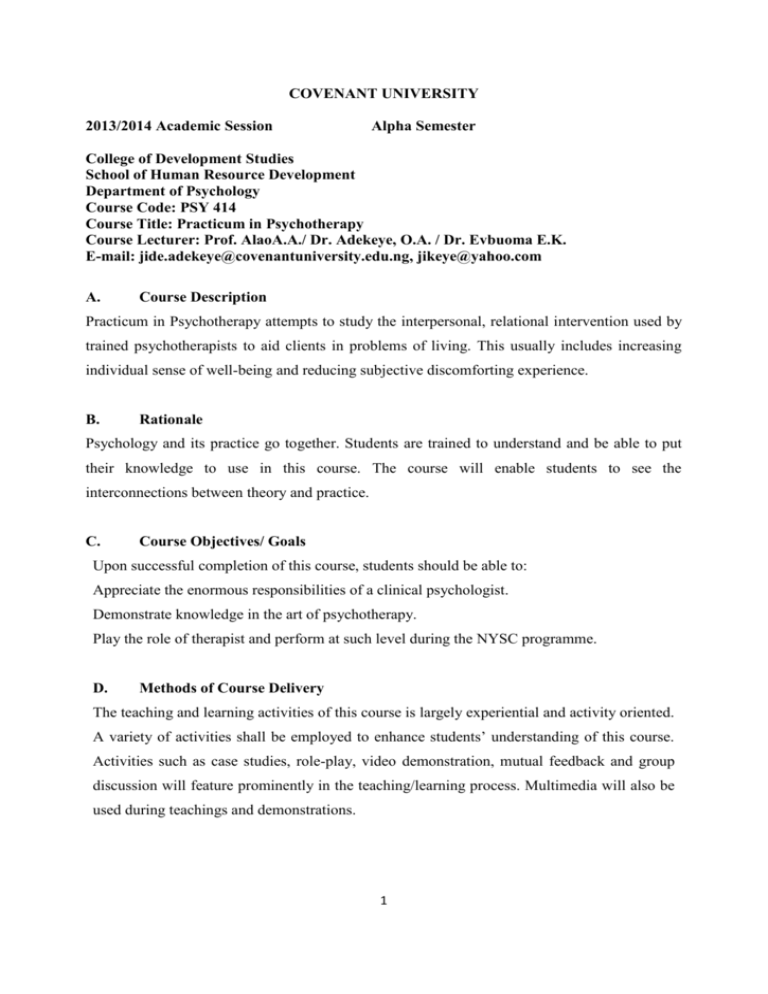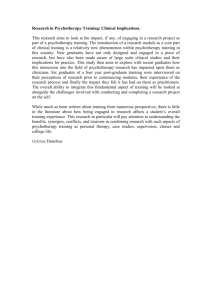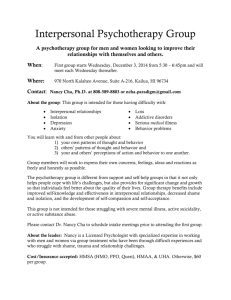Go To
advertisement

COVENANT UNIVERSITY 2013/2014 Academic Session Alpha Semester College of Development Studies School of Human Resource Development Department of Psychology Course Code: PSY 414 Course Title: Practicum in Psychotherapy Course Lecturer: Prof. AlaoA.A./ Dr. Adekeye, O.A. / Dr. Evbuoma E.K. E-mail: jide.adekeye@covenantuniversity.edu.ng, jikeye@yahoo.com A. Course Description Practicum in Psychotherapy attempts to study the interpersonal, relational intervention used by trained psychotherapists to aid clients in problems of living. This usually includes increasing individual sense of well-being and reducing subjective discomforting experience. B. Rationale Psychology and its practice go together. Students are trained to understand and be able to put their knowledge to use in this course. The course will enable students to see the interconnections between theory and practice. C. Course Objectives/ Goals Upon successful completion of this course, students should be able to: Appreciate the enormous responsibilities of a clinical psychologist. Demonstrate knowledge in the art of psychotherapy. Play the role of therapist and perform at such level during the NYSC programme. D. Methods of Course Delivery The teaching and learning activities of this course is largely experiential and activity oriented. A variety of activities shall be employed to enhance students’ understanding of this course. Activities such as case studies, role-play, video demonstration, mutual feedback and group discussion will feature prominently in the teaching/learning process. Multimedia will also be used during teachings and demonstrations. 1 E. Ground Rules, Regulations and Expectations Boundaries shall be set at the first interactive class, and it shall be an ongoing process. You are encouraged to be an active participant in class. Please feel free to raise questions at any point during lectures, including matters of clarification, theoretical points, or topics to address in class discussion. You should also keep in touch by e-mail or by visiting my office if you have any questions about course expectations or the material covered in class. No student will be allowed into class after fifteen (15) minutes of lectures. You are also expected to maintain proper classroom etiquette. This includes respecting the opinions of others even if you disagree, not talking out of turn. You are expected to simply raise a finger to take permission to contribute to class discussions or to be excused from class. Eating and/or drinking are not permitted in class. Assignments and term papers are expected to be submitted at the appropriate time. Plagiarism and other academic dishonesty will not be tolerated. If you are not familiar with the rules of citing sources in written work or what constitutes plagiarism, you should contact me; all papers are expected to be original work. Students MUST have a 75% class attendance to qualify for examinations. F. Evaluation Plan The grading process shall consist of: Continuous Assessment = 30% Semester Examination = 70% The continuous assessment shall be based on a combination of class tests, quizzes, assignments, term papers and the Mid-semester examinations. Students are expected to have at least 75% class attendance to qualify for examinations G. COURSE MODULES Module 1: Psychological Intervention – a general overview Week 1: What is Psychotherapy? Basic concept of psychotherapy Week 2: General Conditions of Psychotherapy Module 2: Differences among therapeutic approaches Week 3: Differences among therapeutic approaches Module 3: The general model of the process of psychotherapy 2 Week 4: One model of psychotherapy Week 5: Essential process in Psychotherapy Module 4: Approaches of Psychotherapy Week 6: Psychoanalysis Week 7: Behaviour Therapy Week 8: Cognitive Therapy Week 9: Group Therapies and Biomedical Therapies Week 10: Stress-inoculation Therapy Week 11: Revision H. Term Papers/Assignment/Students Activities Discuss the impact of mental disorders on family members and care-givers I. Alignment with Covenant University Vision/Goals This course is richer and deeper in content than hitherto is the case. The approach is to prepare students to achieve excellence and develop the needed confidence and interpersonal skills in the practice of psychology. All of these require capacity building, sacrifice, integrity, responsibility, positive mentality and diligence. J. Industry Relevance Highly relevant in any mental health organization and hospitals K. Required Texts Gaylin, W. (2001). How Psychotherapy really works. New York: McGraw-Hill. L. Recommended Reading Texts Weissman, M. M., Markowitz, J. C., & Klerman, G. L. (2000). Comprehensive guide to interpersonal psychotherapy. New York: Basic Books. 3 Endorsements Course Lecturer/Co-ordinator ---------------------------------------- Signature/Date ---------------HOD ------------------------------------------------------------------- Signature/Date --------------Deputy Dean ---------------------------------------------------------- Signature/Date --------------Dean ------------------------------------------------------------------- Signature/Date --------------Authorized for the web -----------------------Vice Chancellor ---------------------------------------- 4





![UW2 - Psychiatric Treatments [2014]](http://s3.studylib.net/store/data/006859622_1-db6167287f6c6867e59a56494e37a7e7-300x300.png)
